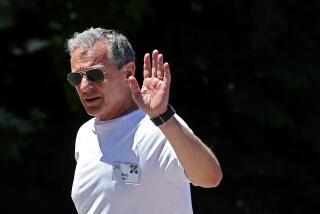JPMorgan’s Jamie Dimon facing push to drop chairman title
- Share via
NEW YORK — A major shareholder vote next week has Wall Street abuzz over the power and future of Jamie Dimon, leader of the country’s biggest bank.
As chairman and chief executive of JPMorgan Chase & Co., Dimon burnished his reputation by steering the bank through the financial crisis virtually unscathed. Charismatic and articulate, Dimon emerged as Wall Street’s most public face, an effective spokesman for an industry under siege by lawmakers, regulators and protesters.
Now Dimon is facing a shareholder push to strip him of the chairman’s job. Tuesday’s vote at JPMorgan’s annual shareholder meeting in Tampa, Fla., isn’t binding, but it has nevertheless become a marquee referendum whose results could rattle nerves across the financial industry.
Among the proposal’s backers are some of the nation’s biggest pension funds, which believe that splitting the roles will add more accountability at the bank. California’s two largest pension funds, which are also the biggest in the nation, have been early supporters.
“The entire market is going to be watching this event unfold,” said Todd Hagerman, a banking analyst at Sterne Agee. “The ramifications are much more broad than perhaps people think.”
The measure was proposed by the American Federation of State and County Municipal Employees. The campaign has won the vocal support of New York City Comptroller John Liu, whose office oversees the city’s pension funds, and Connecticut Treasurer Denise Nappier, who manages that state’s pension funds.
The California Public Employees’ Retirement System, the country’s largest public pension fund, will vote its shares — $636 million worth as of April 30 — to separate JPMorgan’s chairman and CEO roles, spokesman Joe DeAnda said in Sacramento.
The country’s second-largest public pension, the California State Teachers’ Retirement System, has taken a similar stand.
“As a principle, we are for the split between CEO and chairman,” said Ricardo Duran, spokesman for the $164-billion CalSTRS fund, “but this is by no means a statement on Mr. Dimon’s performance. He’s done a good job in guiding the bank through the financial collapse we all suffered through.”
Supporters of splitting the chairman and CEO positions endorse the measure as a matter of principle. They say it is not a vote on Dimon’s leadership.
The campaign has gained traction thanks to JPMorgan’s more than $6-billion loss stemming from wrong-way derivatives bets by a trader nicknamed the London Whale. The losses rekindled fears of the financial crisis and renewed calls for tougher regulation.
Along the way, Dimon’s own reputation suffered. Critics questioned his stewardship over a bank known for strong risk management.
The vote this year is expected by some to be close, but the preliminary results so far have not been made public. Last year, just as the London Whale fiasco was unfolding, 40% of shareholders supported separating the chairman and CEO jobs.
With Dimon holding both posts, JPMorgan remains in the majority — albeit a shrinking one — of companies in the Standard & Poor’s 500 index that have CEOs also heading boards.
According to the consulting firm Spencer Stuart, 57% of S&P; 500 companies had CEOs who were also their chairmen last year. That’s down from 2002, when 75% of the companies combined the roles.
Combined chairman and CEO positions are a relic of an earlier age, when boards merely advised executives, said Charles Elson, director of the John L. Weinberg Center for Corporate Governance at the University of Delaware.
“It’s an idea whose time has come,” Elson said. “Why should the person who is being monitored chair the group monitoring them? It doesn’t make sense.”
JPMorgan has said it believes that a corporate board should be able to split the roles on a case-by-case basis.
The bank’s board has offered a full-throated endorsement of keeping Dimon in both roles, citing the firm’s strong performance. The bank has suffered no quarterly losses during Dimon’s tenure, despite the London Whale trading losses and financial crisis.
Last week Lee Raymond, the presiding director of JPMorgan’s board, and William Weldon, who chairs the board’s corporate governance and nominating committee, urged shareholders in a letter to vote against splitting Dimon’s role. In the letter, they also endorsed reelecting board members who oversee risk policy and audits.
“Our current structure provides the balance good corporate governance seeks to achieve and it would be a mistake to change it now,” they wrote.
Indeed, the board has shown a willingness to flex its muscle. After the London Whale incident, the board cut Dimon’s pay 50% last year to $11.5 million.
Dimon has declined to say what he would do if a majority of shareholders vote in support of taking away his chairmanship. Some on Wall Street have worried that the measure’s victory could hasten Dimon’s departure.
Hagerman, the banking analyst, expects Dimon to stay on perhaps five more years. And although he believes that Dimon would ensure a graceful, seamless exit even if it comes sooner, Dimon’s departure would nonetheless mean a “pretty severe loss” for Wall Street.
“You’ve had a very strong voice in Washington that has been very influential,” Hagerman said.
Although another bank executive would surely step forward as a strong industry voice, Hagerman said, “it’s difficult to say that anyone could fill those shoes.”
Tangel reported from New York and Lifsher from Sacramento.
More to Read
Inside the business of entertainment
The Wide Shot brings you news, analysis and insights on everything from streaming wars to production — and what it all means for the future.
You may occasionally receive promotional content from the Los Angeles Times.











